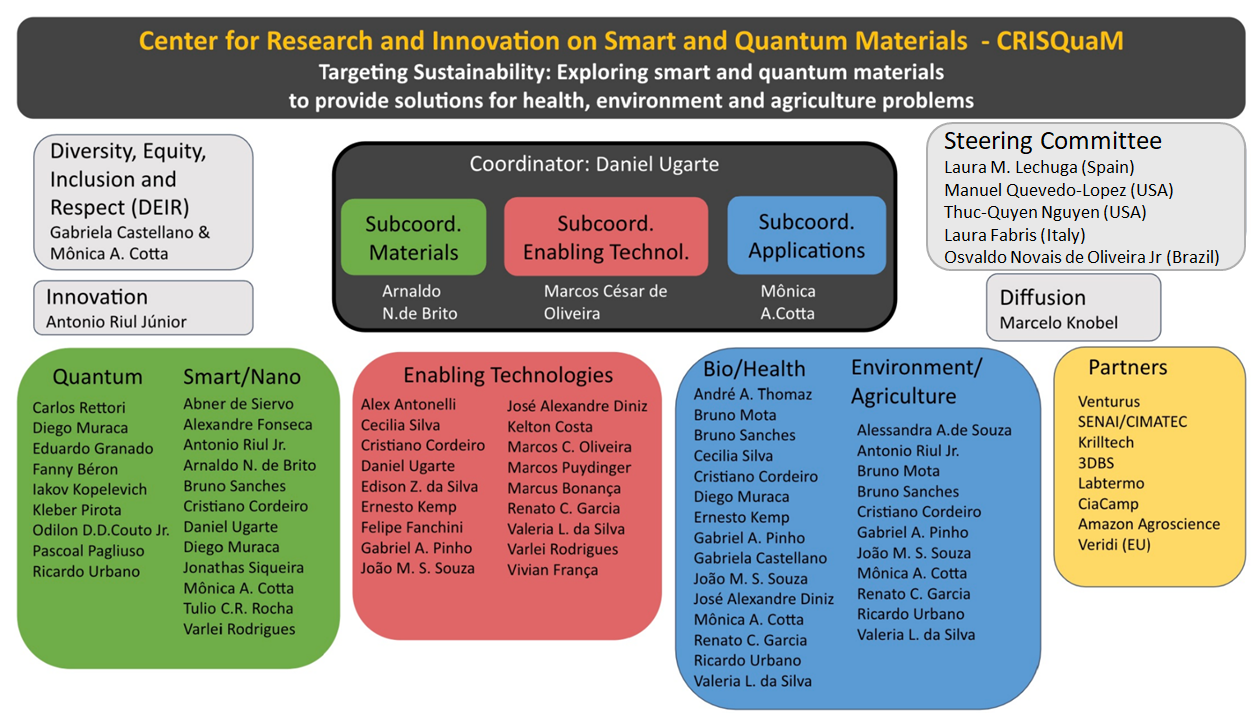BV-FAPESP: research projects supported in this Center
CRISQuaM in the Media: news about the center
CRISQuaM aims to explore the synergistic development of fundamental and applied science to create new materials with high potential for the construction of devices and sensors to address technological challenges related to sustainability, climate change, precision agriculture, ecology, and health. To achieve these goals, we have assembled an interdisciplinary and collaborative research team, integrating expertise across various scientific domains, researching novel materials with high innovation potential. By combining original synthesis methods, advanced characterization techniques, theoretical approaches, computational simulations, quantum technologies, and device construction designs, we aim to drive advances in smart and quantum materials, promoting scientific excellence and technological development. With this, we plan disruptive innovations in instrumentation—including hardware and AI-based tools—as well as in quantum technologies, biomedical devices, and signal processing, in addition to plant bionics, exploring plant-pathogen interactions. Besides research activities, we plan intensive actions in education, dissemination, and communication for the general public, as a modern society should be aware of the challenges humanity faces and how research and technology are essential for responsibly utilizing the planet's limited resources. CRISQuaM's Innovation activities are accelerated through partnerships with several companies in related technologies, many of them Brazilian. Finally, all activities of the Center are managed in accordance with diversity, equity, and inclusion goals and best practices.
The Center brings together scientists, engineers, and innovators in a collaborative effort to apply materials science and quantum technologies at the cutting edge, designing new materials and nano(bio)sensors for advanced diagnostics. The Center has a team capable of producing a wide range of (nano/micro) materials, along with precise chemical and physical characterizations using modern techniques (synchrotron, advanced microscopy, magnetotransport, magnetic resonance, optics, etc.). In addition, the team offers various options in enabling technologies, including miniaturization, processing, and additive manufacturing, as well as instrumentation, quantum sensing, and electronics development. Data analysis will employ updated approaches (numerical simulation, classical and quantum machine learning, and quantum optimization). Applications at the knowledge frontier will address urgent sustainability needs in environmental areas, precision agriculture, plant bionics, and biomedical interfaces, contributing to the development of local technologies in close partnership with the Brazilian industry.
The organization of the Center is based on three pillars — Materials, Enabling Technologies, and Applications — together with partner companies, as described in the figure below.

2024-06-26
Supported by FAPESP, Shell, the Technological Research Institute (IPT) and the University of São Paulo (USP), this Applied Research Center will investigate technologies that promote decarbonization and optimization of deep-sea oil and gas operations, contributing to the future of the offshore industry.
2024-06-26
The study is the first to show that femtosecond pulsed laser irradiation is effective and safe in mice with induced ocular melanoma, paving the way for minimally invasive targeted treatment of the disease in future.
2024-06-26
Researchers analyzed landslides caused by storms in São Sebastião (Brazil) in 2023, when at least 65 people died, and suggest involvement of the local community in contingency programs.
2024-06-26
In an online seminar hosted by FAPESP and the U.S. National Science Foundation, researchers presented on initiatives aimed at promoting equity in science, technology, engineering and mathematics (STEM).
2024-06-26
Heads of the two agencies met on June 24th and renewed the cooperation agreement signed in 2019; a joint workshop on precision agriculture will be held on Saturday as part of FAPESP Week China.
2024-06-24
As described in Scientific Reports, the study involved analysis of blood samples from volunteers infected by Plasmodium vivax, which produces forms that lie dormant in the host and can be reactivated months after treatment. The findings will help detect and diagnose these forms, with significant potential to enhance control and treatment of the disease in future.